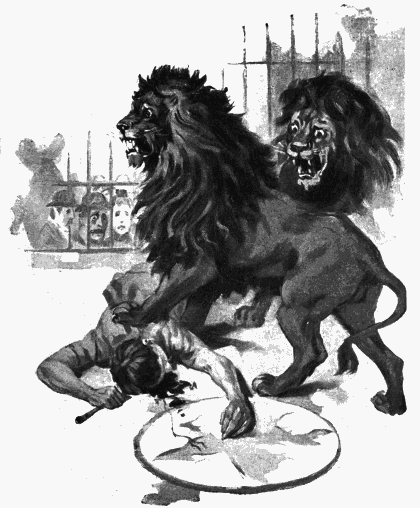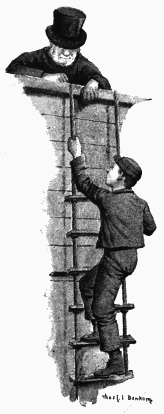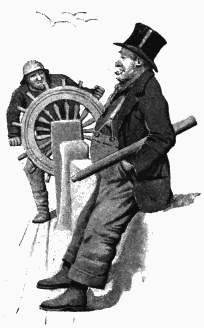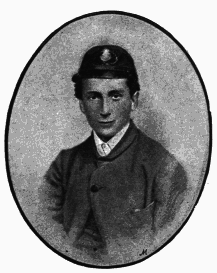'The Family Scapegrace,' however, had appeared under my own name, so that concealment was out of the question; it was in one volume, a form of publication which, at that time at all events (though I see they now affirm the contrary), was unpopular with the libraries, and I was quite an unknown novelist. Under these circumstances, I have never forgotten the kindness of Mr. Douglas (of the firm of Edmonston & Douglas), who gave me fifty pounds for the first edition of the book—by which enterprise he lost his money. There were many reasons for it, no doubt, though the story has since done well enough, but I think the chief of them was the alteration of the title to 'Richard Arbour,' which, contrary to the wishes both of myself and my publisher, was insisted upon by a leading librarian. It is difficult, nowadays, to guess his reason, but people were more 'square-toed' in those times, and I fancy he thought his highly respectable customers would scent something Bohemian, if not absolutely scampish, in a Scapegrace. A mere name is not an attractive title for a book; though many books so called—such as 'Martin Chuzzlewit' and 'Robinson Crusoe'—have become immensely popular, they owed nothing to their baptism; and certainly 'Richard Arbour' prospered better when he got rid of his rather commonplace name.
A rather curious incident took place with respect to this book, which annoyed me greatly at the time, because I was quite unacquainted with the queer crotchets and imaginary grievances that would-be literary persons often take into their heads. Somebody wrote to complain that he had written (not published) a story upon the same lines, and even incidents, as 'The Family Scapegrace,' just before its appearance in the columns of Chambers's Journal, and the delicate inference he drew was that, whether in my capacity of editor or otherwise, I must have somehow got hold of it. He gave the exact date of the conclusion of his own composition, which was prior to the commencement of my story in the Journal.
Conscious of innocence, but troubled by so disagreeable an imputation, I laid the matter before Robert Chambers.
'You are not so versed in the ways of this class of person as I am,' he said, smiling; 'but since he has been so injudicious as to give a date, I think we can put him out of court. I am one of those methodical individuals who keep a diary.' And on reference to it, he found that I had read him my story long before that of my traducer, according to his own account, had left his hands.
It was a small matter, but proved a useful lesson to me, for there is a great deal of imposture of this kind going on in the literary world; sometimes, as perhaps in this case, the result of mere egotistic fancy, but also sometimes begotten by the desire to levy blackmail.

The above, so far as I can remember them, are the circumstances under which I published my first novel. I am sorry to add that poor Tickeracandua, to whom it owed so much, subsequently met the very fate in reality which I had assigned to him in fiction; though as good a fellow as many I have met out of a show, he came to the same end as 'Don't Care' did in the nursery story, and was 'eaten (or at all events killed) by lions.'
'THE WRECK OF THE "GROSVENOR"'
By W. Clark Russell

I AM complimented by an invitation to tell what I can recollect of the writing, publication, and reception of the earliest of my sea books, 'The Wreck of the "Grosvenor."' I approach the subject with diffidence, and ask the reader to forgive me if he thinks or finds me unduly egotistical. 'John Holdsworth: Chief Mate,' preceded 'The Wreck of the "Grosvenor."' I do not regard that story as a novel of the sea. I was reluctant and timid in dealing with ocean topics when the scheme of that tale came into my head; I contented myself with pulling off my shoes and socks and walking about ankle deep into the ripples. But in the 'Grosvenor' I went to sea like a man; I signed articles aboard her as second mate; I had ruffians for shipmates, and the stench of the harness-cask was the animating influence of the narrative. It is the first sea book I ever wrote, in the sense, I mean, that its successors are sea books: what I have to say, therefore, agreeably to the plan of these personal contributions, will refer to it.

And first, I must write a few words about my own experience as a sailor. I went to sea in the year 1858, when I was a child of thirteen years and a few months old. My first ship was a well-known Australian liner, the 'Duncan Dunbar,' commanded by an old salt, named Neatby, who will always be memorable to me for his habit of wearing the tall chimney-pot hat of the London streets in all weathers and parallels, whether in the roasting calms of the Equator, or in the snow-darkened hurricanes of the Horn. I went to sea as a 'midshipman' as it is termed, though I never could persuade myself that a lad in the Merchant Service, no matter how heavy might be the premium his friends paid for him, has a right to a title of grade or rating that belongs essentially and peculiarly to the Royal Navy. I signed for a shilling a month, and with the rest of us (there were ten) was called 'young gentleman'; but we were put to work which an able seaman would have been within his rights in refusing, as being what is called 'boys’' duty. I need not be particular. Enough that the discipline was as rough as though we had been lads in the forecastle, with a huge boatswain and brutal boatswain's mates to look after us. We paid ten guineas each as a contribution to some imagination of a stock of eatables for the midshipmen's berth; but my memory carries no more than a few tins of preserved potatoes, a great number of bottles of pickles, and a cask of exceedingly moist sugar. Therefore, we were thrown upon the ship's provisions, and I very soon became intimately acquainted with the quality and nature of the stores served out to forecastle hands.

I made, but not after the manner of Gulliver, several voyages into remote nations of the world, and in the eight years I was at sea I picked up enough knowledge to qualify me to give the public a few new ideas about the ocean life. Yet when the scribbling mania possessed me it was long before I could summon courage to write about the sea and sailors. I asked myself, Who is interested in the Merchant Service? What public shall I find to listen to me? Those who read novels want stories about love and elopements, abductions, and the several violations of the sanctities of domestic life. The great mass of readers—those who support the circulating libraries—are ladies. Will it be possible to interest ladies in forecastle life and in the prosaics of the cabin?

Then, again, I was frightened by the Writer for Boys. He was very much at sea. I never picked up a book of his without lighting upon some hideous act of piracy, some astounding and unparalleled shipwreck, some marvellous island of treasure. This writer, of a clan numerous as Wordsworth's 'little lot of stars,' warned me off and affrighted me. His paper ship had so long and successfully filled the public eye that I shrank from launching anything real, anything with strakes and treenails, anything with running rigging so leading that a sailor would exactly know what to let go when the order was given. In plain English, I judged that the sea story had been irremediably depressed, and rendered wholly ridiculous by the strenuous periodic and Christmas labours of the Writer for Boys. Had he not sunk even Marryat and Michael Scott, who, because they wrote about the sea, were compelled in due course by the publishers to address themselves exclusively to boys! The late George Cupples—a man of fine genius—in the course of a letter to me, complained warmly of being made to figure as 'Captain' George Cupples upon the title-page of his admirable work, 'The Green Hand.' He assured me that he was no captain, and that his name thus written was merely a bookseller's dodge to recommend his story to boys.